Goanna celebrates debut album Spirit of Place with national tour, 40 years on
The songs that entrenched Goanna in the nation’s musical psyche ring even truer as the Geelong-born folk-rock band bursts forth from a long hibernation with a national tour.
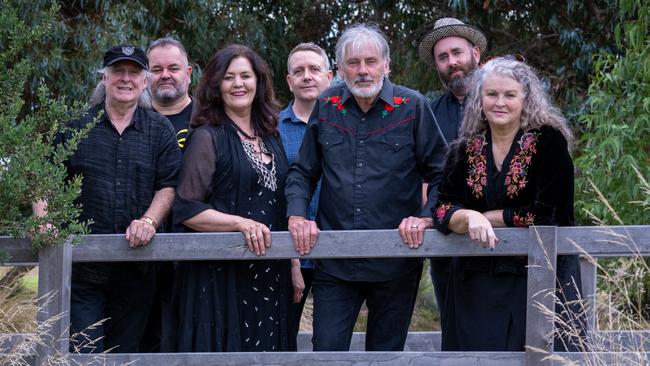
On a Friday afternoon in early March, seven musicians are tuning up, checking their levels and facing rows of empty seats. They are readying themselves and their instruments to begin rehearsals ahead of a couple of very big gigs, which are also among the first live shows folk-rock band Goanna has performed together in decades.
Collectively satisfied, they lock eyes with the band leader, who soon says into the microphone a few words that glimmer like gold amid the hills and valleys of Australian music. “Let’s play Solid,” says the silver-haired singer, and after clocking nods in response, the band kicks its most famous song into gear without fanfare.
Even in this sterile environment, absent an audience, the song hums with goosebump-inducing electricity. Built on a shifting drumbeat and a hypnotic electric guitar line, Solid Rock pulses as the musicians pour themselves into the song.
Written by Shane Howard after a camping trip at Uluru, it has long stood as a perfect marriage of ear-catching arrangement, a winning chorus melody and lyrical intent centred on an empathy for Aboriginal dispossession. It begins: “Out here nothin’ changes, not in a hurry anyway / You can feel the endlessness, with the coming of the light of day …”
About 20km to the west, at a football oval in Geelong, some 30,000 people have gathered for the first stadium concert held anywhere in Australia since the pandemic, headlined by US band Foo Fighters. But inside this multi-arts space named The Potato Shed on Victoria’s Bellarine Peninsula, something just as meaningful is taking place.
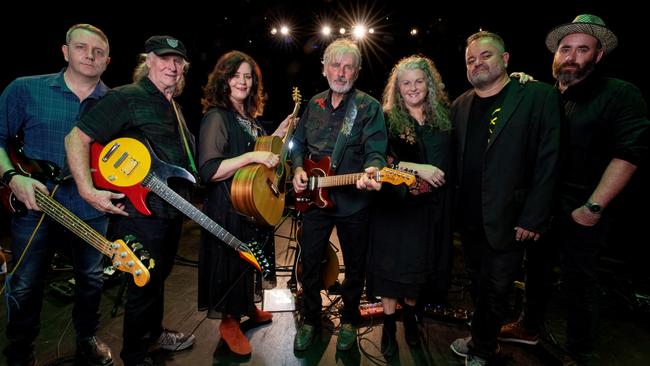
Established in Geelong, Goanna released its debut album, titled Spirit of Place, in 1982. Led by Solid Rock, it became a multi-platinum hit, but the group recorded just one more album in 1985’s Oceania before disbanding in 1987 after a decade-long run.
Since then, its performances have been few and far between: one concert in 1998 for the Melbourne International Arts Festival, and one in Geelong in 2002 at a benefit for Balinese victims of the Bali bombing.
As Review sits in on a few songs at this Friday rehearsal, we hear nothing like the aural equivalent of blowing off the cobwebs from the four band members who played the 1982 debut, in singer and guitarist Howard, his sister Marcia (vocals/guitar), Rose Bygrave (keys/vocals) and Graham Davidge (guitar).
Instead, backed by a tight rhythm section in Ruben Shannon (bass) and Marcus Ryan (drums), as well as keyboardist Richard Tankard, the band sounds great, and its between-song discussions are more about nailing vocal harmonies than the bones of the arrangements.
The musicians’ immediate focus is to ready themselves ahead of supporting Sydney rock band Midnight Oil at an outdoor show at a nearby winery the following night, with a performance at WOMADelaide festival scheduled the following weekend in South Australia.
Both of these gigs take place before the announcement of a 22-date national tour that will run from June to November, taking in the Top End to Tasmania.
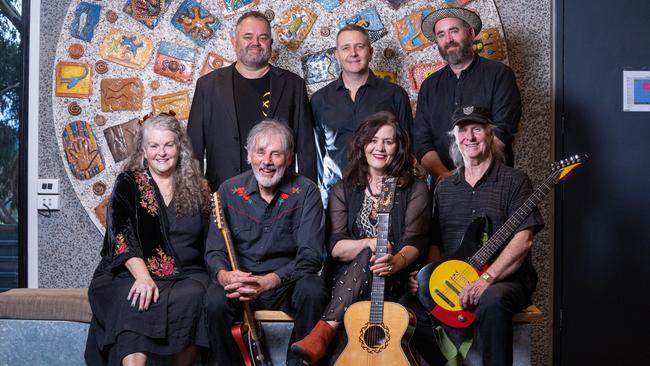
During our visit, Howard tells Review that, although he has continued performing several songs from this era of Goanna in his solo career, he had otherwise jettisoned most of that material until recently, when music promoter and entrepreneur Brian Taranto urged him to consider regathering the band for the 40th anniversary.
“It forced me to go back and listen to [the songs], and play them again, and I fell in love with that album again,” he says. “There’s a lot of hurt attached to the record, I suppose, with the demise of Goanna – but I heard all that youthful optimism, and I thought, ‘F..k it. What we were doing then was right. It was good.’
“It was naive, youthful optimism – but look at us now,” he says. “We find ourselves in a time of climate change. Forty years ago, we’re singing about the Franklin River, which was the beginning of the environmental movement in this country; about Aboriginal rights, and we’ve come some way, but we’ve still got a long way to go. We’ve still got a lot of Aboriginal people incarcerated disproportionately. Lots of stuff needs to be fixed in this country, but we’re on the mend.”
Howard, 67, says the songs still work. “As an old man, I’m able to look back and go, ‘The things that we said in that frisson of youthful vigour? They hold truer now.’ It’s a bit like [Irish writer] Samuel Beckett: at 85, he said, ‘I wouldn’t want my youth back, not with the fire in me now.’ That’s how I feel about things.
“All we can do is sing those songs and remind people,” says the band leader, as he strides into rehearsal with his colleagues. “Is it nostalgic? Yeah, it is. It’s sentimental, but the word ‘nostalgia’ implies a twinge of pain. There is a twinge of pain in Goanna, and in those songs; we got broken and beaten up by a pretty cynical world.”
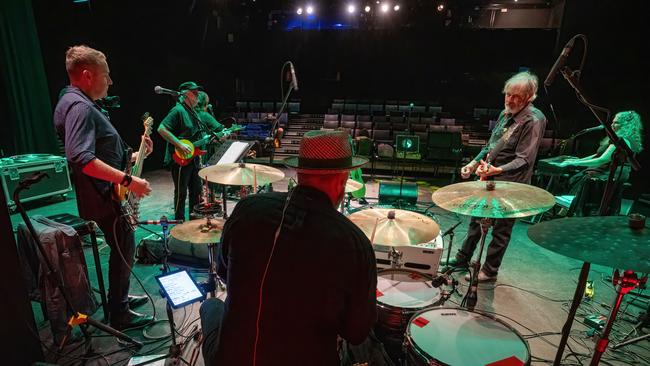
In a mid-June phone interview, a week before the national tour is due to start in far north Queensland, Howard tells Review with a laugh that they’ve done things back to front so far this year: rather than starting small, they kicked off with several major shows in front of big crowds, before settling into the upcoming run of smaller theatre shows.
What was most striking about their rehearsal three months earlier was the harmony on display between the four original members, who gave the impression that they were genuinely thrilled to be in each others’ company again after many years away from the stage. Was it always this easy to get along?
“You always have that thing when you set out as a band: you’re full of vim and vigour, and there’s lots of built-up grease and grime, back in the day,” Howard says. “We laughed about this recently: the reality is, whatever your personality differences were back then, in the ’80s, they will be your personality differences now. But what’s different is we’re all older and we’re kind of able to laugh at ourselves, and identify that stuff.
“That’s what age brings: you let all that stuff go through the keeper and you laugh about it, because you’re not out there to make a name for yourself; you’re out there to honour what you did back then to the best of your ability,” he says. “At this age, it’s about enjoying the experience, and knowing that this is the one time you’ll get to do this again, probably. This won’t come again.”
The songs on Spirit of Place, in particular, mean a great deal to a lot of people: the album sold an estimated 500,000 copies domestically, and despite the long hibernation, news of the band’s resurgence has been well-received across the country, with no small amount of older ears re-attuning themselves to sounds that shaped their world – and world view – four decades ago. Is there a sense of pride attached to all of that?
“This far down the track, we know what we did: we know that Solid Rock went on to become a pretty iconic song in this country’s musical landscape,” replies Howard. “We know that that album has embedded itself in the Australian psyche; we don’t have to sell it. It’s been a successful record, and Goanna established a brand and an identity. We just have to go and honour that; we don’t have to create it. Pride’s a tricky word, but there is a sense of achievement, and honouring that achievement.”
The frontman notes that, while the musical parts are all there on the record, and playing them faithfully is fairly straightforward, getting a band of players to gel is a whole other art form in itself. He recalls something a fellow performer once told him: “Music is how humans flock.”
Forty years after the release of the album that gave him a career as a singer-songwriter, Howard loves this idea of our shared ability to move together in time, and in pitch, en masse. After a lifetime as a performer, he knows better than most that the high moments in live music are sublime, ephemeral and fleeting – but if you’re having them on stage, the audience is probably having them, too.
Goanna’s national tour celebrating Spirit of Place will begin in Cairns on Saturday, June 25 through to Sunday, November 6 in Ballarat.


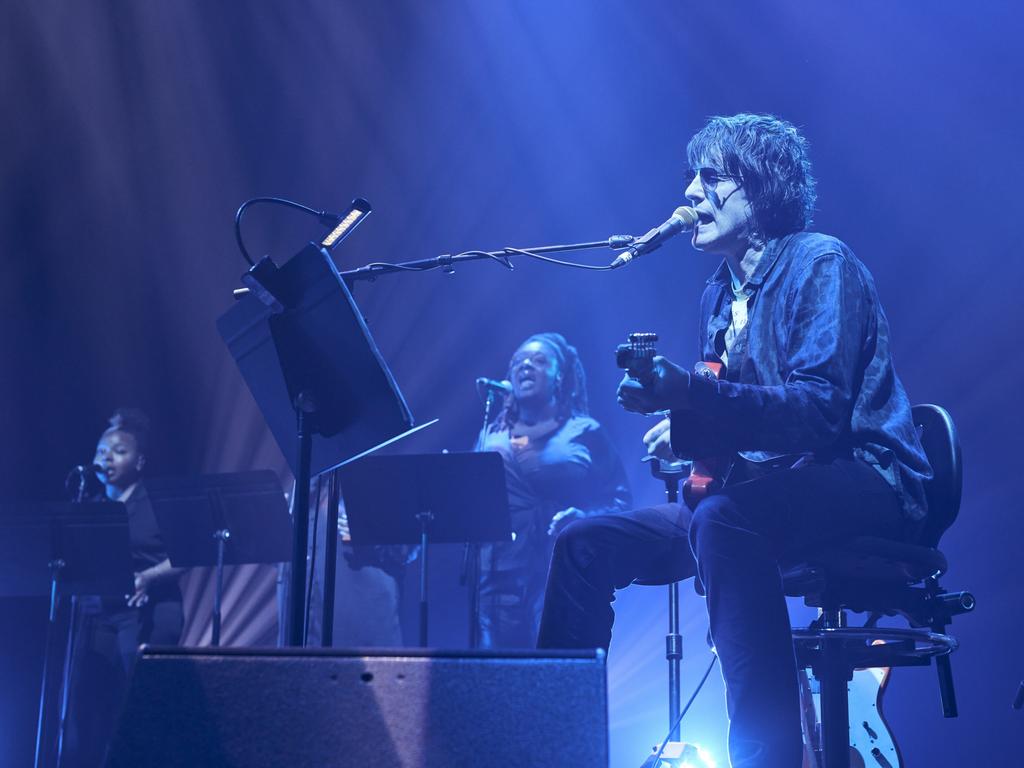


To join the conversation, please log in. Don't have an account? Register
Join the conversation, you are commenting as Logout